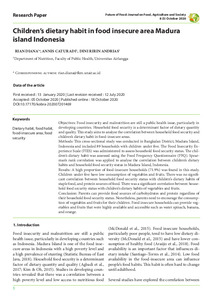Datum
2020-10-18Schlagwort
300 Sozialwissenschaften, Soziologie 630 Landwirtschaft, Veterinärmedizin IndonesienErnährungsgewohnheitErnährungssicherungKindMetadata
Zur Langanzeige
Aufsatz

Children’s dietary habit in food insecure area Madura island Indonesia
Zusammenfassung
Objectives: Food insecurity and malnutrition are still a public health issue, particularly in developing countries. Household food security is a determinant factor of dietary quantity and quality. This study aims to analyse the correlation between household food security and children’s dietary habit in food-insecure areas.
Methods: This cross-sectional study was conducted in Bangkalan District, Madura Island, Indonesia and included 89 households with children under five. The Food Insecurity Experience Scale (FIES) was administered to assess household food security status. The children’s dietary habit was assessed using the Food Frequency Questionnaire (FFQ). Spearman’s rank correlation was applied to analyse the correlation between children’s dietary habits and household food security status in Madura Island, Indonesia.
Results: A high proportion of food-insecure households (71.9%) was found in this study. Children under five have low consumption of vegetables and fruits. There was no significant correlation between household food security status with children’s dietary habits of staple food, and protein sources of food. There was a significant correlation between household food security status with children’s dietary habits of vegetables and fruits.
Conclusion: Parents can provide food sources of carbohydrates and protein regardless of their household food security status. Nonetheless, parents need to encourage the consumption of vegetables and fruits for their children. Food insecure households can provide vegetables and fruits that were highly available and accessible such as water spinach, banana, and orange.
Methods: This cross-sectional study was conducted in Bangkalan District, Madura Island, Indonesia and included 89 households with children under five. The Food Insecurity Experience Scale (FIES) was administered to assess household food security status. The children’s dietary habit was assessed using the Food Frequency Questionnaire (FFQ). Spearman’s rank correlation was applied to analyse the correlation between children’s dietary habits and household food security status in Madura Island, Indonesia.
Results: A high proportion of food-insecure households (71.9%) was found in this study. Children under five have low consumption of vegetables and fruits. There was no significant correlation between household food security status with children’s dietary habits of staple food, and protein sources of food. There was a significant correlation between household food security status with children’s dietary habits of vegetables and fruits.
Conclusion: Parents can provide food sources of carbohydrates and protein regardless of their household food security status. Nonetheless, parents need to encourage the consumption of vegetables and fruits for their children. Food insecure households can provide vegetables and fruits that were highly available and accessible such as water spinach, banana, and orange.
Zitierform
In: Future of Food: Journal on Food, Agriculture & Society Vol. 8 / No. 3 (2020-10-18) EISSN 2197-411XSammlung(en)
Vol 08, No 3 (2020) (Future of Food: Journal on Food, Agriculture & Society // The Future of Food Journal: Journal on Food, Agriculture & Society)Zitieren
@article{doi:10.17170/kobra-202007201469,
author={Diana, Rian and Adi, Annis Catur and Andrias, Dini Ririn},
title={Children’s dietary habit in food insecure area Madura island Indonesia},
journal={Future of Food: Journal on Food, Agriculture & Society},
year={2020}
}
0500 Oax
0501 Text $btxt$2rdacontent
0502 Computermedien $bc$2rdacarrier
1100 2020$n2020
1500 1/eng
2050 ##0##http://hdl.handle.net/123456789/11969
3000 Diana, Rian
3010 Adi, Annis Catur
3010 Andrias, Dini Ririn
4000 Children’s dietary habit in food insecure area Madura island Indonesia / Diana, Rian
4030
4060 Online-Ressource
4085 ##0##=u http://nbn-resolving.de/http://hdl.handle.net/123456789/11969=x R
4204 \$dAufsatz
4170
5550 {{Indonesien}}
5550 {{Ernährungsgewohnheit}}
5550 {{Ernährungssicherung}}
5550 {{Kind}}
7136 ##0##http://hdl.handle.net/123456789/11969
<resource xsi:schemaLocation="http://datacite.org/schema/kernel-2.2 http://schema.datacite.org/meta/kernel-2.2/metadata.xsd"> 2020-11-13T14:19:23Z 2020-11-13T14:19:23Z 2020-10-18 doi:10.17170/kobra-202007201469 http://hdl.handle.net/123456789/11969 eng Urheberrechtlich geschützt https://rightsstatements.org/page/InC/1.0/ dietary habit food habit food insecure area food security 300 630 Children’s dietary habit in food insecure area Madura island Indonesia Aufsatz Objectives: Food insecurity and malnutrition are still a public health issue, particularly in developing countries. Household food security is a determinant factor of dietary quantity and quality. This study aims to analyse the correlation between household food security and children’s dietary habit in food-insecure areas. Methods: This cross-sectional study was conducted in Bangkalan District, Madura Island, Indonesia and included 89 households with children under five. The Food Insecurity Experience Scale (FIES) was administered to assess household food security status. The children’s dietary habit was assessed using the Food Frequency Questionnaire (FFQ). Spearman’s rank correlation was applied to analyse the correlation between children’s dietary habits and household food security status in Madura Island, Indonesia. Results: A high proportion of food-insecure households (71.9%) was found in this study. Children under five have low consumption of vegetables and fruits. There was no significant correlation between household food security status with children’s dietary habits of staple food, and protein sources of food. There was a significant correlation between household food security status with children’s dietary habits of vegetables and fruits. Conclusion: Parents can provide food sources of carbohydrates and protein regardless of their household food security status. Nonetheless, parents need to encourage the consumption of vegetables and fruits for their children. Food insecure households can provide vegetables and fruits that were highly available and accessible such as water spinach, banana, and orange. open access Diana, Rian Adi, Annis Catur Andrias, Dini Ririn Indonesien Ernährungsgewohnheit Ernährungssicherung Kind publishedVersion EISSN 2197-411X No. 3 Future of Food: Journal on Food, Agriculture & Society Vol. 8 false </resource>
Die folgenden Lizenzbestimmungen sind mit dieser Ressource verbunden:
Urheberrechtlich geschützt

